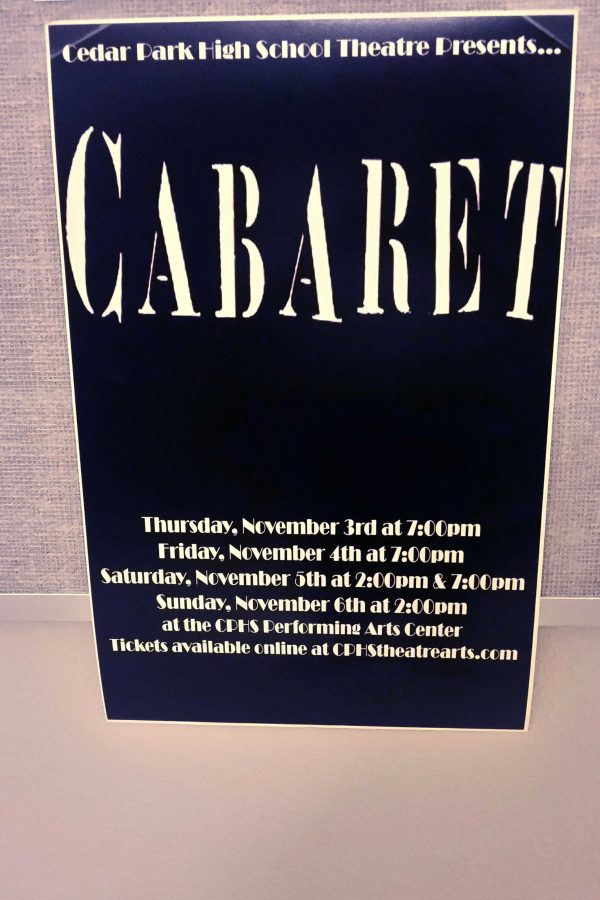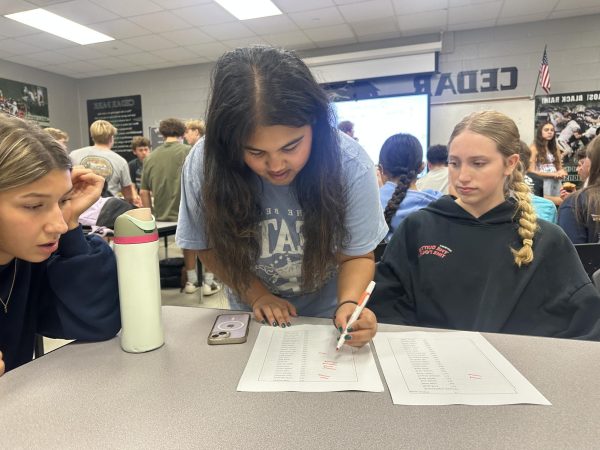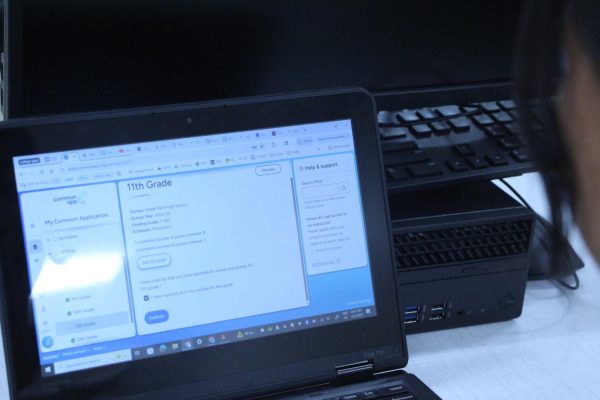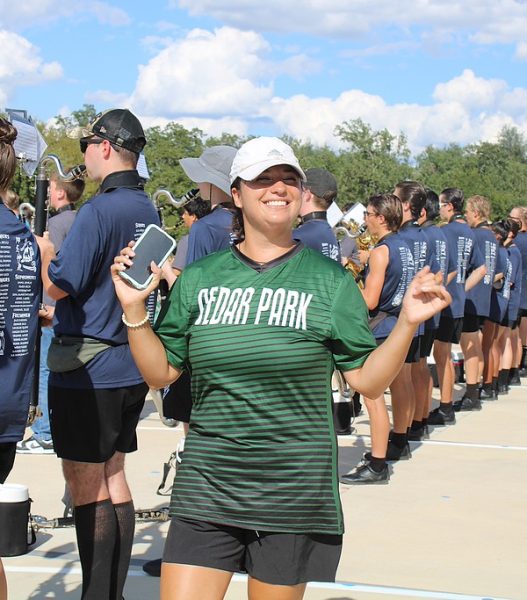“Cabaret’s” Leading Ladies
Posters featuring the dates and the times of the play are posted around school. Go to CPHStheatrearts.com to purchase your tickets today.
October 24, 2016
As one walks down the dim lighted hallway, they are greeted to the melodic sounds of theater students’ voices musical ranges. The students grasp tightly on to their pale white scripts lettered with bright yellow and black markings. Repeating line after line, theater students practice their roles for the upcoming musical: “Cabaret.”
Premiering on two dates: on Nov. 3-4 at 7:00 p.m., and Sat. Nov. 5 at 2:00 p.m. and 7:00 p.m., students have been preparing day and night for the four shows which will be held in the PAC. Two women lead the show. Chris Hathcock, is one of “Cabaret’s” leading ladies as the director of the play. She chose the musical because of the literary merit and the challenge it poses for students.
“This play is an important play for us, and it’s an important play for actors,” Hathcock said. “I love this play. My mom grew up in Nazi Germany so it was important for me to work on this piece of music and art. I think that this particular piece is misunderstood a lot of the times and misrepresented and it’s important to bring in the aspect of really incredible circumstances happening to ordinary people and what the result is.”
As director, Hathcock does more than just running lines, organizing dates and times for rehearsal, she is the theater student’s escort to the realities of theater.
“My job as director is to really guide them on their journey, so that they will reference their personal experiences in made up circumstances [like the play] to obtain the work and the level of depth of emotion they need to reach into,” Hathcock said. “That’s what we do in theater, because none of it is real, but at the end of the day the challenge is to make it look real and represent real. Obviously, no one here at Cedar Park has been through the Holocaust, but what you do is you do dive into your character, you do character history and you draw upon as much research as you possibly can. There is so much historical work that goes into what we do.”
One of the main characters in the musical “Cabaret” is Sally. A young optimistic girl placed in WWII. Senior Deirdre Wolf has been chosen to play in this role.
“I just think that Sally is really sort of one of those dream roles because it’s really iconic because Lisa Melony played it and Emma Stone briefly played in on Broadway and it’s really like an iconic role,” Wolf said. “All of her songs from the show are just iconic. The characters and songs are iconic and it’s really cool. Last year I was the understudy and it’s really cool to go from that to this. Before I was watching the process and now I am living it which is really wild. It’s honestly a privilege because it really makes you think about hardship, how we deal with hardship and really puts a spotlight on human nature. It’s such a privilege to get to do that and sing songs about it.”
However, to get the musical in the best shape is no easy task according to Wolf. Working sometimes into the late night, she talks about the difficulties that come with being a lead in such a hard hitting play.
“The first act is really happy and exciting and everything is fine, but then it starts to deteriorate in the second act and starts to get serious,” Wolf said. “I think that act [Act 2] is really important, it’s not boring. But it starts getting really into the issue of the musical. You go from being happy to being sad and drained in WWII.”
While performing such dramatic emotions is difficult, according to Wolf. From having to be at dance rehearsals, to running lines with Hathcock, Wolf feels like she needs to be doing everything at once.
“I am in more than half the scenes,” Wolf said. “It’s me and someone else talking [in a scene] which makes it hard for the rest of the people to work, making it a burden on everyone to do. It’s a burden on me and that’s an issue. In professional theater it wouldn’t be hard because you have the whole day to do it. But in high school you have three to four hours after school to get everything done, it’s a little wild.”
Managing time though, as difficult as it is, is not the only challenging aspect of this musical says Hathcock.
“We have a lot of new actors this year and one of the challenges is getting everyone up to the same speed at the same time because everyone doesn’t work on the same value,” Hathcock said. “When you work in education it’s different because you are having to work with each individual at their pace and push the people that need pushing and guide everyone at the same time. It’s really a thousand-piece puzzle that you don’t start off with all the pieces, but gain one piece a day and that is how it starts to work together. You don’t really meet the end of result. I know that you can never attain perfection, but you can try.”
The pieces of the puzzle also fully incorporate creating a persona of a character that one has never met. Challenge is good for though soul though, according to Hathcock.
“You’re building a character and you’re building a person which you know is not an easy task and they’re [students] up for the task and they need to be challenged with material that is beyond their grasp,” Hathcock said. “Because if they don’t ever get challenged with things they don’t grow and they don’t get better. If they don’t challenge themselves than what is the point? Sometimes people think that musicals should just be entirely skittles and rainbows and that is not the point. That is not why we do this.”
With all the effort and time spent on this play, Wolf and the rest of the cast have one simple hope.
“I hope that people will come away from “Cabaret” with a greater appreciation for the arts which I think is the goal for all shows,” Wolf said. “I think the purpose of any art, including performing arts, is to make people think and to invoke thought or emotion. “Cabaret” really makes you think about how it is like to deal with pain, death and loss, not that there is death in the show. But it [Cabaret] makes you think about how you would deal with a situation or how other people would deal with a situation. For instance, I think that Sally is one of the characters that people are going to come in and think that they are like because they are a happy person. But by the end your think: am I Sally? They don’t want to be Sally, making them wonder: do I ignore my problems? It makes you think about yourself.”



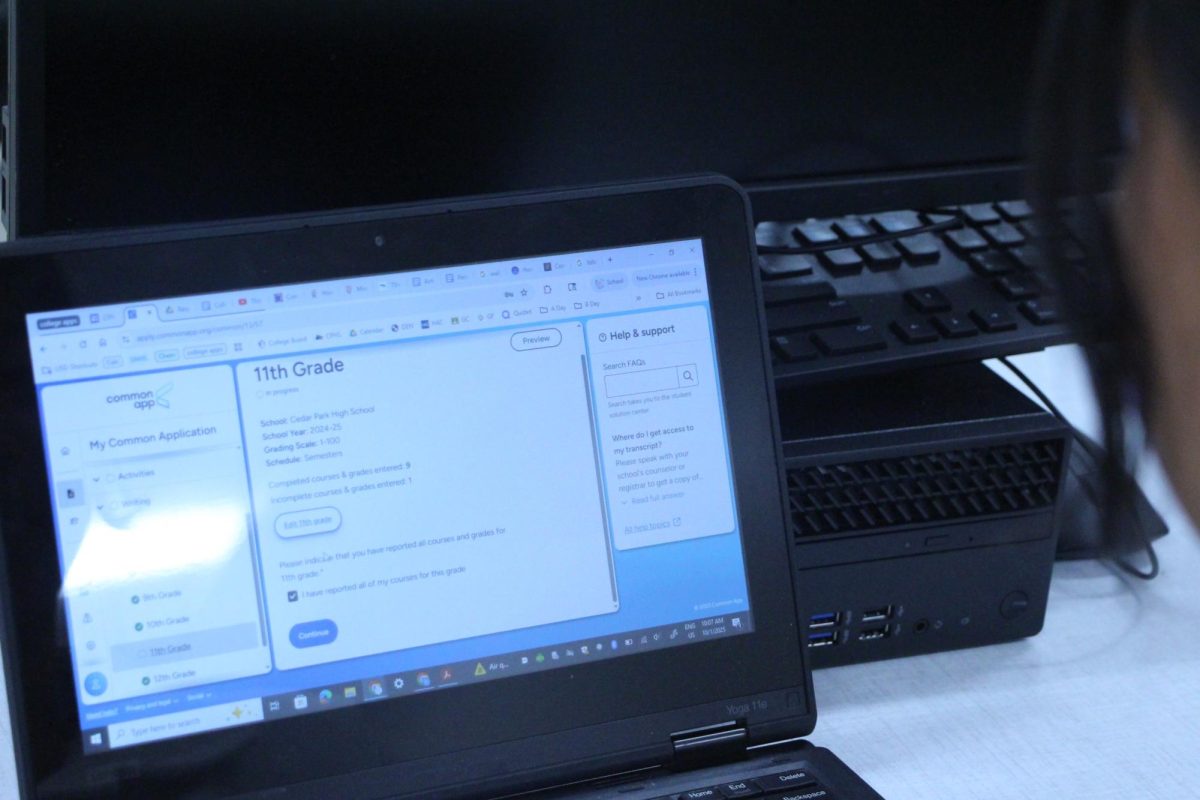






![Broadcast, yearbook and newspaper combined for 66 Interscholastic League Press Conference awards this year. Yearbook won 43, newspaper won 14 and broadcast took home nine. “I think [the ILPC awards] are a great way to give the kids some acknowledgement for all of their hard work,” newspaper and yearbook adviser Paige Hert said. “They typically spend the year covering everyone else’s big moments, so it’s really cool for them to be celebrated so many times and in so many different ways.”](https://cphswolfpack.com/wp-content/uploads/2025/05/edited-ILPC.jpg)



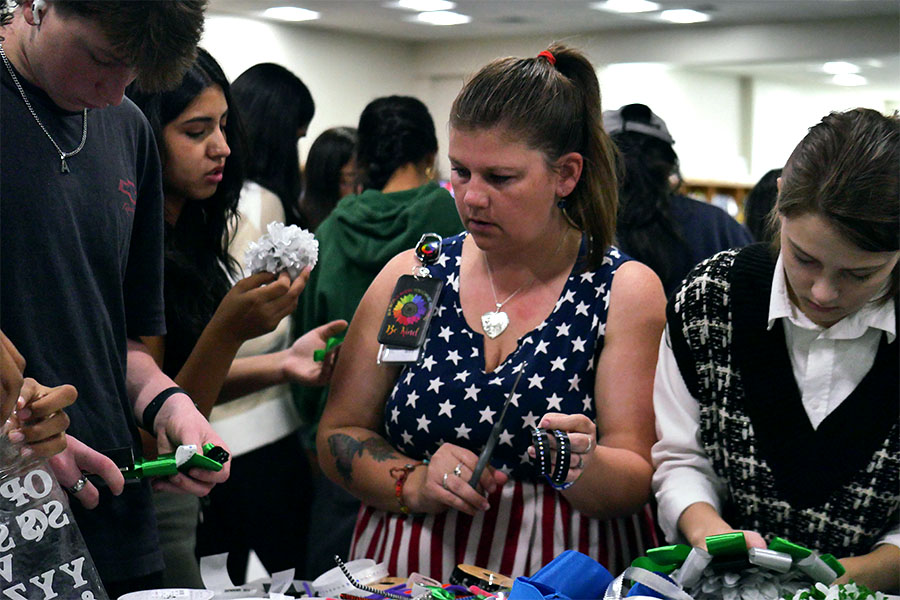

![Looking down at his racket, junior Hasun Nguyen hits the green tennis ball. Hasun has played tennis since he was 9 years old, and he is on the varsity team. "I feel like it’s not really appreciated in America as much, but [tennis] is a really competitive and mentally challenging sport,” Nguyen said. “I’m really level-headed and can keep my cool during a match, and that helps me play a bit better under pressure.” Photo by Kyra Cox](https://cphswolfpack.com/wp-content/uploads/2025/09/hasun.jpg)

![Bringing her arm over her head and taking a quick breath, junior Lauren Lucas swims the final laps of the 500 freestyle at the regionals swimming competition on date. Lucas broke the school’s 18-year-old record for the 500 freestyle at regionals and again at state with a time of 4:58.63. “I’d had my eye on that 500 record since my freshman year, so I was really excited to see if I could get it at regionals or districts,” Lucas said. “ State is always a really fun experience and medaling for the first time was really great. It was a very very tight race, [so] I was a bit surprised [that I medaled]. [There were] a lot of fast girls at the meet in general, [and] it was like a dogfight back and forth, back and forth.” Photo by Kaydence Wilkinson](https://cphswolfpack.com/wp-content/uploads/2025/03/Kaydence-2.7-23-edit-2.jpg)
![As her hair blows in the wind, senior Brianna Grandow runs the varsity girls 5K at the cross country district meet last Thursday. Grandow finished fourth in the event and led the varsity girls to regionals with a third place placement as a team. “I’m very excited [to go to regionals],” Grandow said. “I’m excited to race in Corpus Christi, and we get to go to the beach, so that’s really awesome.” Photo by Addison Bruce](https://cphswolfpack.com/wp-content/uploads/2025/10/brianna.jpg)











